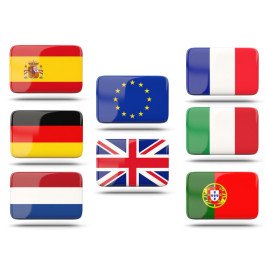How to Keep Your Mobile Data Secure While Using Public WiFi Abroad
Published: 03/02/2025
Public WiFi hotspots are nearly everywhere—airport lounges, hotel lobbies, local cafes, and busy tourist destinations. While these networks offer the convenience of quick, no-cost access to the internet, they can also expose travelers to serious cyber threats. Personal data, including passwords, banking details, and private communications, can be intercepted by hackers who target unsecured connections.
At Wraptel, we understand how vital reliable connectivity is when traveling abroad, whether you’re booking last-minute accommodations, checking flight updates, or simply staying connected with loved ones. But security should never be an afterthought. This is why we recommend taking a proactive approach to safeguard your data whenever you’re using public WiFi.
In this article, we’ll walk through the risks associated with public hotspots, share best practices for staying safe online, and highlight why a dedicated Wraptel is a far more secure alternative. By following these guidelines, you can keep your personal information protected and maintain peace of mind on every journey.
Key Takeaways
- Public WiFi is a security risk – Open networks expose travelers to cyber threats like man-in-the-middle attacks, data sniffing, and malicious hotspots.
- Use a VPN for safer browsing – A Virtual Private Network (VPN) encrypts your data, making it harder for hackers to intercept sensitive information.
- Prioritize mobile data over public WiFi – Cellular networks offer stronger encryption and fewer vulnerabilities, making them a safer alternative.
- Follow cybersecurity best practices – Use HTTPS websites, enable two-factor authentication (2FA), disable auto-connect features, and keep software updated.
- Wraptel provides a secure solution – With global coverage and encrypted data, Wraptel keeps you connected without relying on risky public WiFi.
Public WiFi networks at airports and cafes may seem harmless, but hackers can intercept your passwords and financial info without you even knowing. Stay secure by using a VPN, enabling 2FA, and avoiding sensitive transactions on open networks.
Understanding the Risks of Public WiFi
Open WiFi networks may seem like a convenient lifeline for travelers who need internet access on the go, but these hotspots can turn into traps if not used carefully. Many public networks lack robust encryption or require only a simple password shared openly with anyone nearby. This minimal security makes it far easier for cybercriminals to exploit vulnerabilities and intercept data.
Man-in-the-Middle Attacks
Hackers can position themselves between your device and the WiFi router, gaining access to data you send or receive. This type of attack is especially dangerous if you enter passwords or financial information, as it can be stolen without any visible warning.
Evil Twin Hotspots
Cybercriminals sometimes set up rogue hotspots that look like legitimate networks—often with similar or identical names to the real thing. When travelers connect, believing the network to be safe, all of their internet traffic runs through a malicious router, making it simple for hackers to collect sensitive data.
Malware and Spyware
Unsecured networks can also be channels for distributing malware or spyware. A single click on an infected ad or a suspicious file can compromise your device, granting criminals access to your personal information.
Data Sniffing
In crowded places like airports or malls, criminals can use “sniffing” tools to capture unencrypted data transmitted over public networks. This data could include login credentials, credit card numbers, and personal email exchanges.
Why Tourists Are At Greater Risk
Travelers often need to get online quickly—maybe to check directions, confirm a booking, or contact someone back home. Under time pressure and unfamiliar with local networks, they might inadvertently connect to a hotspot that looks safe but isn’t. The urgency to communicate can overshadow caution, making visitors prime targets for cyberattacks.
Understanding these risks helps underscore the importance of caution when connecting to WiFi abroad. Even seemingly minor activities—like scrolling through social media—can be valuable to cybercriminals seeking personal details or planning identity theft. Later sections will detail how to mitigate these risks, but remember the first step is awareness. Whenever possible, a dedicated mobile data solution like Wraptel provides a more secure and reliable way to stay online without exposing yourself to the inherent dangers of open WiFi networks.
Best Practices for Using Public WiFi Safely
Connecting to public hotspots can still be relatively safe if you follow certain precautions. Below are our recommended best practices to help keep your data secure when you have no choice but to use open WiFi.
Activate a VPN
A Virtual Private Network (VPN) encrypts your data and routes it through secure servers, making it far harder for hackers to intercept. When choosing a VPN, look for:
- Strong Encryption: AES-256 or comparable standards.
- No-Log Policy: Providers that don’t record your browsing history.
- Speed and Reliability: Essential for a smooth browsing experience, especially if you need to make video calls or download large files.
Prioritize HTTPS Websites
Always check if the sites you visit use HTTPS (look for the padlock icon in your browser’s address bar). HTTPS ensures that data passed between your device and the website’s server is encrypted. While it’s not foolproof, it adds an essential layer of security that standard HTTP lacks.
Enable Two-Factor Authentication (2FA)
Wherever possible, use 2FA for email, banking, and social media accounts. Even if someone intercepts your login credentials, a second verification method—like a text message code or an authenticator app—helps keep attackers out.
Limit Sensitive Transactions
Accessing bank accounts, paying bills, or shopping online are all high-risk activities on public networks. If you can’t avoid these tasks, at least ensure you’re using a secure connection (VPN + HTTPS) or switch to a more trusted network or mobile data. We recommend saving critical financial transactions for times when you can use your Wraptel, since cellular data is generally safer than public hotspots.
Keep Software Updated
Old operating systems and outdated apps are prime targets for hackers. Turn on automatic updates so your device regularly installs the latest security patches. This simple step helps close vulnerabilities cybercriminals love to exploit.
Disable Auto-Connect Features
Many phones and laptops are set to automatically connect to previously used networks or open hotspots. Disable this feature in your WiFi settings. Also, keep Bluetooth and file sharing off unless you explicitly need them.
Monitor Your Connections
If the network name seems odd, or if you have any doubts, double-check with a staff member at the location. Malicious hotspots often mimic legitimate ones, using slight name variations to trick people.
Log Out After Each Session
Don’t stay signed in to email or social media accounts on public networks. Log out when you’re finished. Also, avoid checking “Remember Me” boxes that store your login credentials.
Following these best practices significantly lowers your risk of falling victim to cybercrime while using public WiFi. Staying alert is the most critical step, but if you pair caution with proper tools and updated security software, you’ll be well on your way to safer online experiences abroad.
Why a Dedicated Travel SIM Can Be Safer Than Public WiFi
Public WiFi may be easy to find, but it’s also inherently insecure. A more reliable and safer solution is to use a dedicated travel SIM card. Cellular networks typically employ robust encryption protocols that make it much harder for cybercriminals to eavesdrop on your activities.
Benefits of Cellular Connections
- Encrypted Data: Mobile networks use advanced encryption standards, so your data is protected.
- Consistent Speeds: Public WiFi can be congested, whereas cellular networks often provide more stable speeds.
- Fewer Intermediaries: There’s no shared local router; your data goes directly from your device to the cell tower, reducing the risk of interception.
Wraptel: Our Secure Alternative
We designed Wraptel with security and convenience in mind. By accessing local networks in over 150 countries, you can stay connected without juggling multiple SIM cards or relying on spotty public WiFi signals. Our service includes:
- Global Coverage: One SIM for multiple destinations, eliminating the need to swap cards mid-trip.
- Cost-Effective Plans: Various data packages so you pay only for what you need, avoiding hefty roaming fees.
- Easy Setup: Activate your Wraptel before you depart, and enjoy peace of mind the moment you land.
For essential activities like checking your bank balance, downloading important documents, or making online purchases, a dedicated SIM is often the smarter, more secure choice. Relying on mobile data not only boosts your safety but also ensures you have a consistent, high-quality internet connection wherever your travels take you.
Additional Security Tools and Precautions
Even with a secure data connection, there are extra steps you can take to further protect your information:
Mobile Security Apps
- Antivirus and anti-malware apps can detect malicious software before it compromises your device.
- Password managers store your credentials in an encrypted vault, helping you create and maintain strong, unique passwords.
Device Encryption
- Most modern smartphones offer encryption features that safeguard all files on your device. Enable this option under your security settings to prevent unauthorized access.
Remote Wipe & Find My Device
- iOS and Android systems provide built-in tools (Find My iPhone and Find My Device) that help you track a lost phone or erase its data remotely. Turn these on before traveling for an extra layer of protection.
Regular Backups
- Save important files, photos, and contacts to a secure cloud service or external drive. In case your device is lost or stolen, you can quickly restore essential information.
Combining these tools with a Wraptel connection makes it exponentially harder for criminals to get hold of your data, ensuring your personal information stays confidential throughout your journey.
Travel Security Checklist
Planning ahead reduces stress and helps you stay secure from the moment you leave home. This quick-reference checklist covers key steps before, during, and after your trip.
Before Departure
- Order a Wraptel SIM or eSIM: Get it activated and test it on your device.
- Update All Software: Operating systems, apps, antivirus programs—ensure everything has the latest security patches.
- Set Up VPN & 2FA: Choose a reliable VPN and enable two-factor authentication on critical accounts.
- Back Up Important Data: Store copies of your passport, itinerary, and other documents securely online.
Upon Arrival
- Disable Auto-Connect: Turn off auto-join for WiFi networks to avoid rogue hotspots.
- Keep Bluetooth Off: Only enable it if absolutely necessary, then switch it off again.
- Use Secure Networks: Rely on your Wraptel or reputable networks recommended by your hotel.
During Your Stay
- Avoid Sensitive Transactions on Public WiFi: Save banking or sensitive tasks for your mobile data connection.
- Log Out: Sign out of email and social media apps when finished.
- Stay Alert: Monitor for suspicious network names or unusual device behavior.
Before Flying Home
- Review Account Activity: Check bank statements and email logs for any unusual activity.
- Clear Unnecessary Data: Delete local files you no longer need.
- Change Passwords: Consider updating passwords for critical accounts if you used any public WiFi.
Common Misconceptions About Data Security Abroad
Several myths can lull travelers into a false sense of security:
Free WiFi is Harmless.
Free doesn’t mean secure. Many free hotspots lack proper encryption, making data theft easier.
No One Cares About My Social Media Browsing.
Criminals can gather personal details from social feeds for targeted attacks or identity theft.
VPNs Are Too Slow.
While some VPNs can reduce speed, many modern services have optimized servers. Balancing a minor speed loss against significantly enhanced security is usually worth it.
I Have Nothing to Hide.
It’s not just about secrecy. If criminals access even your basic personal data, they can impersonate you or commit financial fraud.
Frequently Asked Questions
Q1: Is a VPN enough to protect my data on public WiFi?
A VPN greatly improves security, but basic precautions—like using HTTPS sites and avoiding sensitive transactions—are still necessary.
Q2: Does Wraptel work in multiple countries without extra costs?
Yes. Our SIM covers numerous destinations with various data plans. Check our coverage list to confirm specific locations before you travel.
Q3: How can I tell if a hotspot is legitimate?
Always verify the network name with staff. If the name has typos or multiple versions, it might be a malicious copy.
Q4: Should I turn off WiFi when not in use?
Yes. Turning off WiFi saves battery and prevents your device from automatically connecting to unknown networks.
Conclusion: Secure Mobile Data While Traveling
Staying connected abroad shouldn’t come at the cost of security. Public WiFi is convenient, yet fraught with hidden risks—from malicious hotspots to data interception. Taking sensible steps, such as using a VPN, enabling 2FA, and regularly updating your devices, drastically reduces the chances of a breach.
Ultimately, relying on your Wraptel remains the safest option for most travelers, offering robust encryption and reliable coverage. With careful planning and the right tools, you can enjoy both freedom and peace of mind wherever you roam.
Stay connected securely wherever you travel—get your Wraptel eSIM or SIM Card today for fast, reliable, and encrypted mobile data in over 150 countries!
Further Reading
- Cybersecurity Tips for International Travelers: The Federal Communications Commission provides guidelines to help international travelers protect their devices and personal information from cyber threats.
- Public Wi-Fi: A Guide to the Risks and How to Stay Safe: Norton provides an overview of the dangers associated with public Wi-Fi and offers strategies to protect your data while using these networks.
- Are Public Wi-Fi Networks Safe? What You Need to Know: The Federal Trade Commission discusses the security of public Wi-Fi networks and provides tips on how to protect your personal information online.
- Vacation and Travel Security Tips: The National Cybersecurity Alliance shares advice on maintaining cybersecurity during travel, including how to handle devices and data securely.






